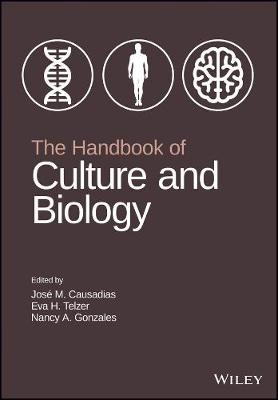
The Handbook of Culture and Biology
John Wiley & Sons Inc (Hersteller)
978-1-119-18136-1 (ISBN)
- Keine Verlagsinformationen verfügbar
- Artikel merken
Jose M. Causadias is Assistant Professor of Psychology at Arizona State University. He researches how the interplay of cultural and biological processes shapes the development of psychopathology and health and well-being. Eva H. Telzer is an Assistant Professor of Psychology and Neuroscience at the University of North Carolina Chapel Hill. She researches how cultural processes shape brain development, with a focus on family and peer relationships and long-term psychological well-being. Nancy A. Gonzales is Foundation Professor of Psychology at Arizona State University. She studies the role of culture in children's development, psychopathology and resilience.
Foreword: On culture and biology.
Kevin Laland.
Preface: Why culture and biology?
José M. Causadias.
Part 1: General issues in culture and biology interplay
Chapter 1: Introduction to culture and biology interplay.
José M. Causadias, Eva H. Telzer, and Nancy A. Gonzales.
Chapter 2: Integrating culture and biology in psychological research: Conceptual clarifications and recommendations.
Moin Syed and Ummul–Kiram Kathawalla.
Chapter 3: Understanding religion from cultural and biological perspectives.
Stefanie Northover and Adam B. Cohen.
Part 2: Animal Culture
Chapter 4: Introduction to animal culture: Is culture uniquely human?
Charles Snowdon.
Chapter 5. Comparing and contrasting primate and cetacean culture.
Jennifer Botting, Erica van de Waal, and Luke Rendell.
Chapter 6. Cultural phenomena in cooperatively breeding primates.
Charles Snowdon.
Part 3: Cultural genomics
Chapter 7: How are genes related to culture? An introduction to the field of cultural genomics.
José M. Causadias and Kevin Korous.
Chapter 8: Dual inheritance, cultural transmission, and niche construction.
Michael J. O’Brien and R. Alexander Bentley.
Chapter 9: How the study of religion and culture informs genetics and vice versa.
Ronda F. Lo and Joni Y. Sasaki.
Part 4: Cultural Neurobiology
Chapter 10: Introduction to cultural neurobiology: Evidence from physiological systems.
Leah D. Doane, Michael R. Sladek, and Emma K. Adam.
Chapter 11: The relationship among culture, poverty, stress, and allostatic load.
Stacey N. Doan and Gary W. Evans.
Chapter 12: Biological consequences of unfair treatment: A theoretical and empirical review.
Anthony Ong, Saarang Deshpande, and David Williams.
Chapter 13: Cultural experiences, social ties, and stress: Focusing on the HPA axis.
Shu–wen Wang and Belinda Campos.
Chapter 14: Cultural influences on parasympathetic activity.
LaBarron Hill and Lori S. Hoggard.
Chapter 15: Neurobiology of stress and drug use vulnerability in culturally diverse communities.
Ezemenari M. Obasi, Kristin A. Wilborn, Lucia Cavanagh, Sandra Yan, & Ewune Ewane
Part 5: Cultural Neuroscience
Chapter 16: An introduction to cultural neuroscience.
Lynda Lin and Eva H. Telzer.
Chapter 17: Neurobiological causes and consequences of cultural differences in social cognition.
Meghan L. Meyer
Chapter 18: Culture and self–other overlap in neural circuits.
Michael E. W. Varnum and Ryan S. Hampton.
Chapter 19: Developmental cultural neuroscience: Progress and prospect.
Yang Qu and Eva H. Telzer.
| Verlagsort | New York |
|---|---|
| Sprache | englisch |
| Gewicht | 666 g |
| Themenwelt | Geisteswissenschaften ► Psychologie |
| Naturwissenschaften ► Biologie | |
| ISBN-10 | 1-119-18136-4 / 1119181364 |
| ISBN-13 | 978-1-119-18136-1 / 9781119181361 |
| Zustand | Neuware |
| Haben Sie eine Frage zum Produkt? |